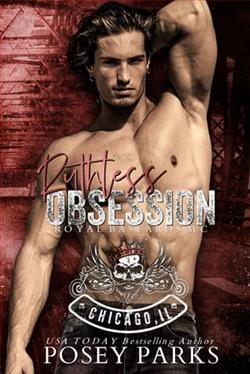Page 35 of Remi's War (Four Dark Horsemen 2)
“Of course not.” I hook a strand of hair over my ear. “It’s not exactly a popular name. And how convenient for you that it goes with mine, huh?”
He snatches out his phone, clicks on it a few times, and then puts it on the table, sending it flying to me, and I catch it easily.
It’s a photo of his ID with his full name, and I blink a few times, not believing it.
Remi Odysseus Reyes.
“I’ve never met anyone with such a name.” And really, what are the odds to stumble on this man in Chicago of all places?
A smile shapes his mouth, and he winks at me, taking a sip and then twisting his glass in his hand, the shimmering light from above reflecting in it and casting colorful designs on the table. “Some would say we were destined to meet each other.”
Homer, a famous Greek poet, wrote two masterpieces during his lifetime, Iliad and Odyssey.
When the Trojan prince Paris fell in love with King Menelaus’s wife, Helen, and stole her, it led to the Greeks declaring war on Troy. It lasted ten years, with the Greeks winning and setting Troy on fire. Since Troy had an unbreakable wall, they used trickery. They built the Trojan Horse and presented it as a gift from the gods. Soldiers hid in it, and then once the horse was brought inside the city, they all emerged and burned and conquered it.
The war saw many losses, victories, and loves stories with brave and power-hungry, vicious men on both sides who would do anything to win.
Three characters stood out the most for me.
Hector, the Trojan prince who protected his land with everything in him and whose skills and morality inspired respect even in the Greeks. One of the bravest men who just wanted to live peacefully with his family but was denied that right.
Achilles, the best warrior of the Greeks, participated in war for endless glory and found it. It cost him his life, but he had no value for it anyway. According to him, it was better to die in good company than live in a bad one.
Among them all, though, there was one who survived the war and made it home.
Odysseus was a king of Ithaca who was known for his calm demeanor and cunning intelligence, which greatly served the Greeks during the Trojan War. He was a big advocate for it and managed to handle a lot of internal conflicts in order for the army to continue fighting, showcasing his diplomatic skills. If Achilles was known for his temper and anger that flared like hot flashes, then Odysseus was the opposite of him, always thinking first and acting later.
However, compared to the mighty warrior, he had a reason to come home—his beloved wife Penelope and his son.
After the Greeks won the war, he started his journey to Ithaca and faced so many challenges a lesser man would have given up.
But after ten years—or twenty in total, if you count the war—he made it home just in time to save his wife from an unwanted marriage as many suitors wished to marry her and snatch Ithaca for themselves.
Penelope, though, stayed faithful to her husband and declined them all, patiently waiting for him to come home. Through the years, she used many tricks in order to avoid unwanted matches and the need to choose a new suitor.
My father always found Homer’s work fascinating. A lot of his paintings are inspired by it, and that’s why he decided to name me Penelope. According to him, she showed so much character and will, being brave and keeping the love for her husband burning brightly in her heart even though there was no hope. He wished for me to find a love story like theirs.
For me it made zero sense, though, even as a child, but I never told my dad.
Their love story, in my opinion, is tragic. To lose each other and be separated right after you had a son… while you are young and carefree… to reunite after facing so many hardships?
Who would wish for such a love story?
“Destiny is a fickle thing,” I finally reply to him. “Besides, I can’t say I dreamed about meeting Odysseus.”
He leans back on the couch, placing his arm on the top of it, and drums his fingers, his diamond watch glistening. “Not really into romance?” He clacks his tongue. “Where is your adventurous nature?”
“Please,” I mutter, finishing my wine and putting the glass on the table. “She stayed faithful to him while he had other women. He even spent a year with the goddess Circe on his way back, drinking and having fun.” I don’t really hold him sleeping with others against him, considering it had been twenty years for the guy, but what’s romantic in all this?
The dude literally lived his best life while his wife suffered.
“Didn’t she hold his men hostage at first, turning them into swine? Arguably, Odysseus had no choice.” He throws a challenge my way and swirls his drink, the ice rubbing against each other, and the sound echoes in the space.
“If my husband’s only choice to survive is to fuck someone else for a whole year, he can stay with her. I’ll mourn him for life.” This excuse is such bullshit anyway. According to the poem, she never forced him to sleep with her. Obviously, I shouldn’t judge their actions through the modern prism, but alas.
Remi throws his head back and laughs, my cheeks heating up at this, while I sigh in resignation, ready to hear more teasing about it. No one understands my point of view, so I’m used to it. Especially my father, who just looks at me weirdly whenever I bring up this point.
Maybe men see it differently? I don’t know.















